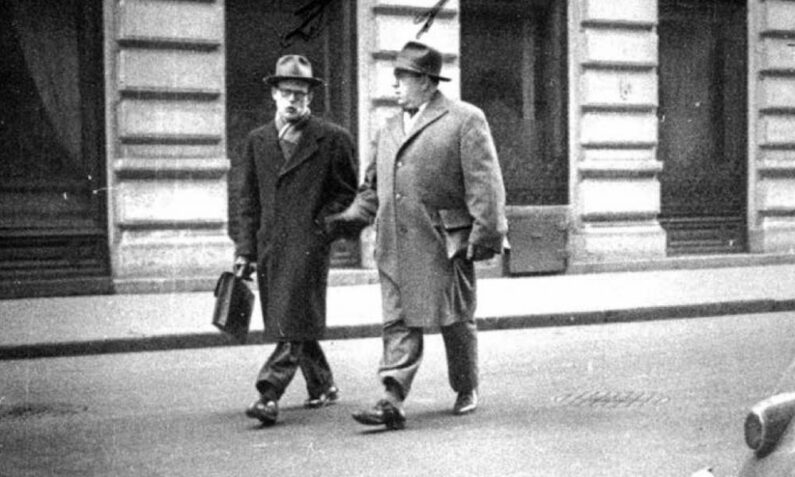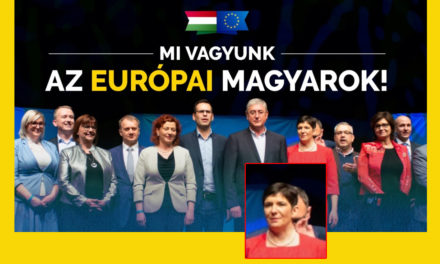The historian Zsuzsanna Borvendég's series was originally published on the PestiSrácok website, but there are certainly those who missed it. But those who haven't read all the parts should also read it again. Knowing the whole picture, can we understand how we got here?
A very strange figure appeared from time to time among the business partners of the Frankfurt trade office. Already in the first half of the 1950s, he came into contact with Hungarian foreign workers several times, but only after the revolution did he become a regular visitor to our country. He enthusiastically helped build the domestic political elite's network of contacts with the West and spread Kádár's good news in the wider world. His name is Emil Hoffmann. The adventures of another real Nazi with the champions of anti-fascism.
the Emil Hoffmann , one gets the feeling that one is reading the script for a classic James Bond film or a John le Carré novel. Hoffmann visited almost all the secret services that existed and kicked the ball during the years of the development of the Cold War, and hawked the collected information like sophisticated vendors at the flea market. Of course, he didn't pick up the necessary knowledge during flea market sales, he received serious training during the war.
Hoffmann was born in Germany before the First World War, so his childhood and youth were defined by the atmosphere of trauma caused by the lost war, fostering in him a high degree of hatred for the victors, who dispassionately imposed their dictates on the defeated countries. A series of further tragedies followed from this generational sense of life: Hoffmann drifted close to the National Socialists and joined Hitler's party in 1929. He soon became a member of the SA, but its liquidation did not break his career. He became an excellent propagandist, and his qualities as a journalist were already evident at that time. In 1939, he joined Goebbels' propaganda ministry as a trained intelligence officer, from where he was soon transferred to Bucharest as a press attaché.
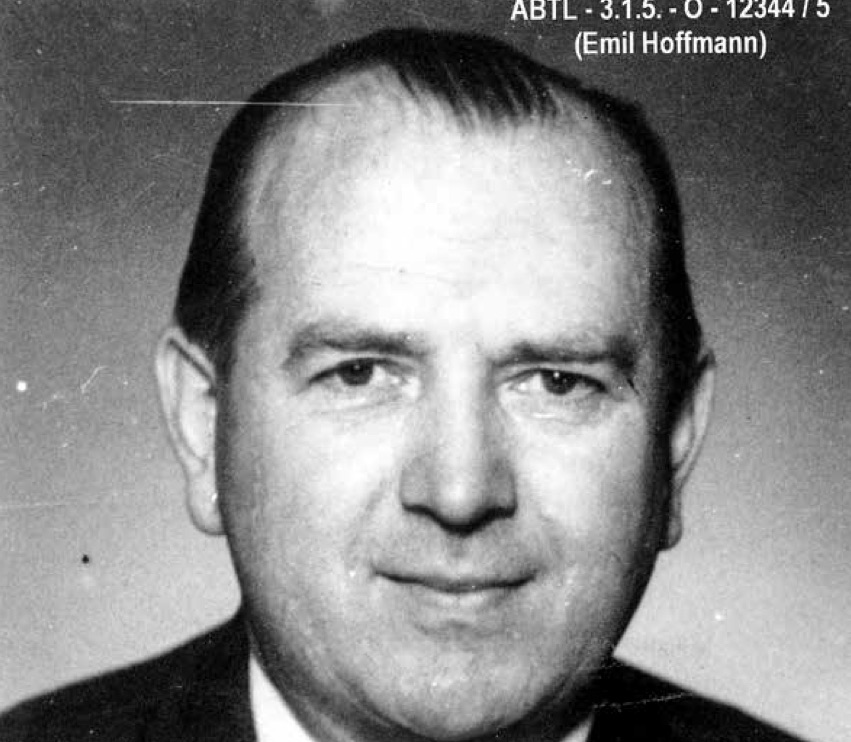
image: ÁBTL
He noticed the fall of the Nazis in time
During the war, he became one of the key figures of the German intelligence network in the Balkans and, Ion Antonescu , transmitted the obtained secret information through Bucharest. It was therefore an adventurous and responsible task, which could perfectly suit his personality. He would have made any sacrifice for the rise of imperial Germany, for the fulfillment of the dreams of a European great power, and therefore served the genocidal Nazi regime loyally for a long time , however, he would not have been a good intelligence officer if he did not notice the inevitably approaching fall in time.
According to his own admission, he contacted the Allies while still in Romania , and in 1944, when he was temporarily transferred to Budapest, he joined the secret network of Admiral Wilhelm Canaris As the first man of the Abwehr, i.e. the German resistance, Canaris colluded with the Anglo-Saxon powers, gave them a lot of information, and misled the German leadership with false information. Canaris never believed in a German victory.
Although Hoffmann proved to be a staunch Nazi at first, he soon realized that he had to act. Albrecht Focke was the link to Canaris, with whom they jointly tried to surround strong people of the German secret service in Budapest, for example Kurt Haller , who Edmund Veesenmayer , the ambassador and plenipotentiary representative of the Third Reich in Hungary, and he maintained contact with the German embassy. and the Arrow party, in fact, it was Haller who first offered Ferenc Szálasi the possibility of a coup at the end of August 1944.
Haller must also have been aware that it would be more advisable to "play for two goals" and allegedly did not shy away from the approach of the Hoffmanns, but he refused the invitation to steal the treasury and gold stock of the German embassy in Budapest, thereby proving his commitment to the Allies. In return, he allegedly received a promise that he would be able to avoid prosecution after the war.
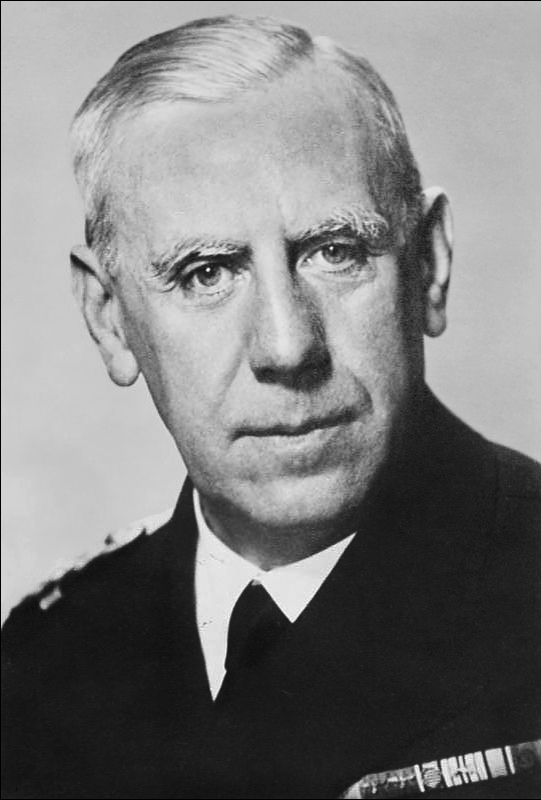
Wilhelm Canaris (image: Wikipedia)
Hoffmann offered his services to everyone
In the meantime, Canaris fell: on July 23, 1944, Hitler arrested him and then executed him. Emil Hoffmann was not under suspicion, but thought it better to disappear from sight, so he volunteered to join the Schutzstaffel (SS) and was sent to the Eastern Front as a war correspondent, from which he escaped sometime in 1945. According to the Soviets, he was in American captivity from July to November 1945, then went to the English zone of Germany, where he contacted an old friend who, as a British secret service man, was immersed in local political life.
And so began Emil Hoffmann's grand masked parade, during which he offered his services to all opposing intelligence agencies except the CIA and the Stasi. He worked for the British, the Italians, the French, the Soviets, but he was known in most socialist countries, including Hungary, and who knows how many other countries he had longer or shorter adventures with the secret services, while in fact he only wanted to flourish his own business enterprises . What else could the former Nazi intelligence officer have done in civilian life than trading based on his wide network of contacts and making use of his journalistic qualities honed on Goebbelsian propaganda.
His political views have always revolved around the vision of a united and neutral Germany, which he saw as the biggest obstacle in the United States. He believed that the Soviets would rather help him, even though he considered himself a committed anti-communist as a National Socialist. This explains the fact that he was happy to visit the Eastern Bloc, although the number one target country for him was not Romania, but Romania, which he knew better.
He took his first business steps towards the countries trapped behind the Iron Curtain as an employee of the Atlas company. In this series, you may have come across the name of Atlas many times; this was the West German company founded by a Polish communist working as a Soviet agent on behalf of the American military secret service, employing former high-ranking Nazi officers.
Atlas was apparently created with the intention of providing cover for covert operations, opening an infiltration channel into enemy territory. Thus, it is understandable that all of its employees were those who had previously gained experience in conducting operative actions at an intelligence agency.
You traded the information brilliantly
Hoffmann therefore started working for the Atlas company at the end of the forties, and from 1951 he took over the management of the Berlin branch office. He had extremely good connections in East Berlin, he also visited the Soviet embassy, and appeared as a journalist and trader in a wide variety of companies and offices. None of the secret services managed to map his entire network of connections, but it is certain that he came into contact with the highest political and economic circles , from where he collected the falling pieces of information with outstanding talent and put them to good use. Until 1952, he often traveled to the countries of the Eastern bloc, visited his old acquaintances, talked with them, and "traded" the data collected in this way in a professional manner.
Most of the time, he did not get access to secret information, but rather only obtained sensitive and unpublished data during private conversations, or thanks to his good observation, he drew conclusions that made it look like he was in possession of the most hidden data series of socialist economies. He was able to manage all this in a brilliant way: he always had some news to drop for the secret services connected to him, whether they were approached by the British, the Soviets, or other bloc agents.
The Americans viewed his movements with suspicion. Since he refused to cooperate with them, they tried to prevent his activities. His passport was confiscated in 1952, after which he decided to move from Berlin, even though the gates of the embassies of the socialist countries in the eastern zone were open to him. He moved next to Bonn.
The "Budapest adventures" have arrived
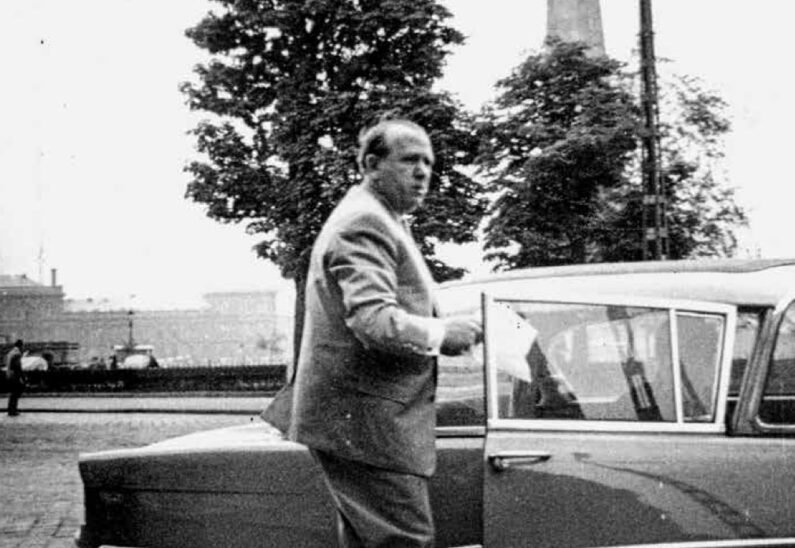
Hoffmann in Hungary (photo: ÁBTL)
I found little information about the next few years in the files of the CIA and the Hungarian state security. He had contacts with companies in Switzerland and Liechtenstein, traveled to China and India, and lobbied the Romanian embassy in Vienna for the establishment of a West German trade office in Bucharest. In 1956, he was completely out of sight: his high-ranking former friends (those with whom he still served Hitler) managed to get the CIA to remove him from close surveillance, stop tapping his phone and checking his letters.
In the researchable documents of the CIA, we find mention that Hoffmann traveled to Hungary in 1956, but the report does not mention his substantive activities, and his other great opponent, the Stasi, did not pay particular attention to the businessman's visits to Budapest either. It seems that it was pushed out of the most important battlefields of the Cold War, and Budapest and Hungary were not remarkable terrain for the "greats" of the secret services.
For us, however, this is when the most exciting phase of Hoffmann's life began.
In the following years, he became a frequent guest of Hungarian foreign trade companies. In friendly conversations , he regularly mentioned that this is the only country in the Eastern bloc that is civilized enough to conclude meaningful trade agreements with it.
In fact, it was about the fact that the domestic foreign trade lobby, which was gaining more and more influence, temporarily found in Hoffmann the person who opened the way to West German industrial companies with strong capital and using the most modern technologies. And Hoffmann could once again feel that he could be in control of the business world he knew so well, teeming with spies, he could flourish his businesses and win financial support from the Hungarian government to start his business weekly.
He had a good tactic: every Western journalist who portrayed the Hungarian party leadership on the road to consolidation in a favorable light was extremely important to Kádár politics. The cooperation seemed to be a mutually beneficial deal, and from 1957 to 1964 Hoffmann was a regular guest of domestic export-import companies and some prominent personalities of the foreign trade administration. Moreover, János Kádár was also willing to personally participate in the implementation of an operative action organized by the state security, in order to make better use of the opportunities arising from Hoffmann's friendship. But more on that next time.
Source: PestiSrácok
Author: historian Zsuzsanna Borvendég
(On the cover image: Hoffmann was also observed by the Hungarian state security. Image source: ÁBTL)

